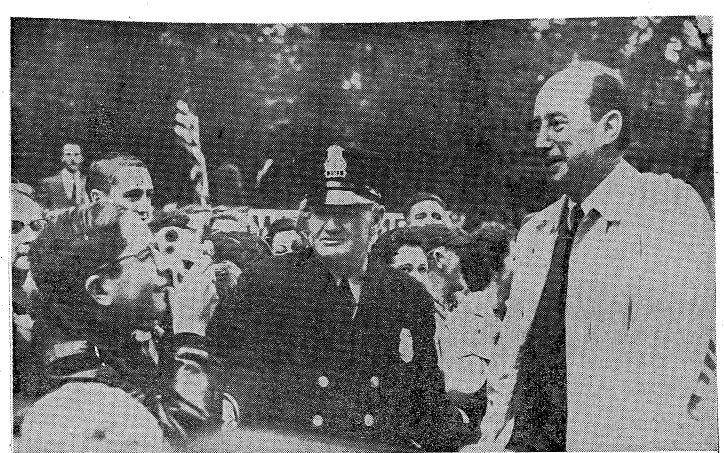Eisenhower
When I was growing up in Scranton, Pennsylvania in the 1950s, Dwight David Eisenhower—universally known as “Ike”—was the two-term president (1953-1961).
I had nothing against Ike. I knew him as the General who had presided over the invasion of Normandy and been a hero in the Second World War, and that he had an appealing personality. But my parents were dyed-in-the-wool Democrats—as refugees from Nazi Germany, FDR had been their hero—and Ralph and Hilde Gardner had little good to say about Ike. Indeed, the whole extended family were fans of Adlai Stevenson, the intellectually oriented two-time Democratic candidate. Realistically, Stevenson had no chance of defeating Eisenhower in 1952 or 1956, and yet the Gardner Menage maintained hope that he would win and were sad when he lost. Here’s a photo of young Howie, equipped with movie camera, and looking admiringly at Adlai.
As I grew up, I became and remained a staunch Democrat. Indeed, I have never voted for a Republican for President, and at most I may have once voted for a Republican—Bill Weld—to be governor of Massachusetts. I knew Weld a bit and liked him personally. But my vote was more a vote AGAINST his Democratic opponent, John Silber—whose mode of handling problems and individuals repelled me—than it was an endorsement of Weld, who would probably himself vote as a Democrat today!
Evolving Perspective
And yet: Without having thought very seriously about it, over recent years, I have surprisingly (but perhaps with increasing firmness) come to the conclusion that Eisenhower was the best president in my lifetime—a life that has seen (in order) Dwight D. Eisenhower, John F. Kennedy, Lyndon B. Johnson, Richard M. Nixon, Gerald R. Ford, Jimmy Carter, Ronald Reagan, George H.W. Bush, Bill Clinton, George W. Bush, Barack Obama, Donald J. Trump, and Joseph R. Biden as presidents! (I was actually alive during the last years of Roosevelt’s presidency—1943-1945—and during Harry Truman’s years in the White House—1945-1953—but was too young to have an opinion myself. See however, this nice autograph that I obtained from Truman some years later—that’s another story for another time.)
Reflection and Metacognition
If we rule out senility, stubbornness, or cynicism: Why this dramatic change of mind on my part? If you’d ask me a month or two ago, here’s the answer that I would have given:
Paths NOT Taken
Eisenhower was the best president, precisely for all the misguided and even venal things that he did NOT do:
He did not get us embroiled in a war in Vietnam (as his successors did).
He did not get us embroiled in a war in the Middle East (As France and England were prepared to do).
He did not significantly lower the federal tax on highest income citizens; (then 91%, now 37%).
Positive Outcomes
And for some positive things that he did do:
He quickly ended the war in Korea (as he had memorably promised to do during the 1952 campaign, and which Truman had failed to do).
He built the interstate highway system.
He found ways to ostracize and ultimately silence the red-baiting Senator Joseph McCarthy, who ruined so many lives. And he did so without having an all-out battle where the functioning of the country would have been jeopardized.
And, while he did not personally feel that the country was ready for de-segregation, he nonetheless sent Federal troops to Arkansas when Governor Faubus defied the Supreme Court’s 1954 decision in Brown vs Board of Education of Topeka.
Confirming a New Outlook
Not known for a lack of self-confidence, I would not have ventured to compose this blog without having done two additional things:
Read a book Ike and Dick about the vexed relationship between Eisenhower and his two-term Vice President Richard Nixon.
Looked into how Eisenhower’s presidency has been rated by American historians.
The book about Eisenhower and Nixon reveals that, even though Julie Nixon (Dick and Patricia’s daughter) and David Eisenhower (Ike and Mamie’s grandson) eventually got married—and have remained married!—Ike and Dick themselves were never close. Indeed, Eisenhower never welcomed Nixon into his network of friends and famously said he could not remember a major decision in which Nixon had played a significant role. Nixon was certainly helpful to Eisenhower in various ways and probably gave Eisenhower a measure of coverage during the tumultuous McCarthy era.
As for the presidential rankings by American historians, I was frankly shocked. Given the promise and the glamour of the Kennedy presidency I thought it would be rated highly. By the same token, Reagan’s popularity (which enabled George H W Bush’ presidency) or Lyndon Johnson’s suite of ground-breaking civil rights laws might have moved their ratings northward.
Takeaways and a Message for the Future
But instead, as of the summer of 2025, my view and the views of presidential scholars converge. Perhaps as we think about presidencies in the future, we should keep in mind not only positive achievements but also the avoidance of damage.
And perhaps, this is a message that is especially welcome and needed these days.
ACKNOWLEDGMENTS
For their insightful comments and helpful nudges, I thank Shinri Furuzawa, Annie Stachura, Kirsten McHugh, and Ellen Winner.



